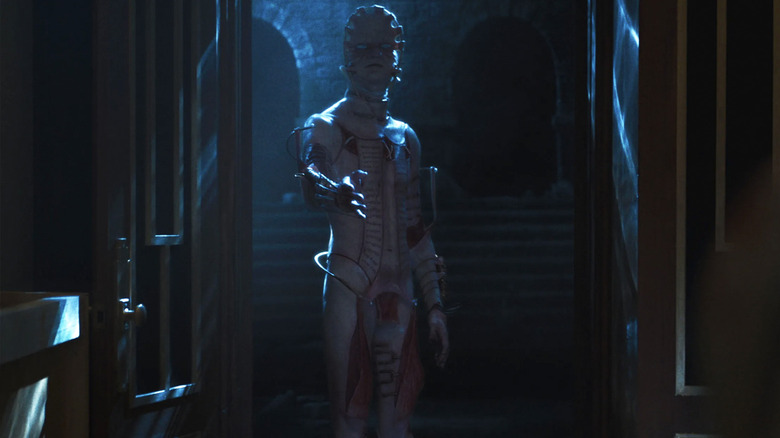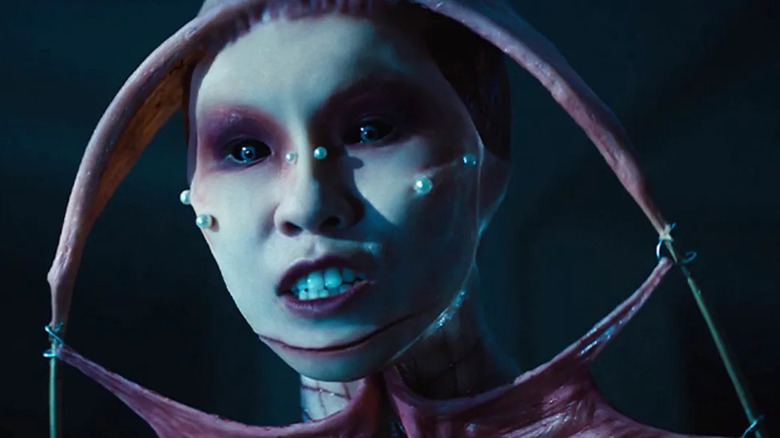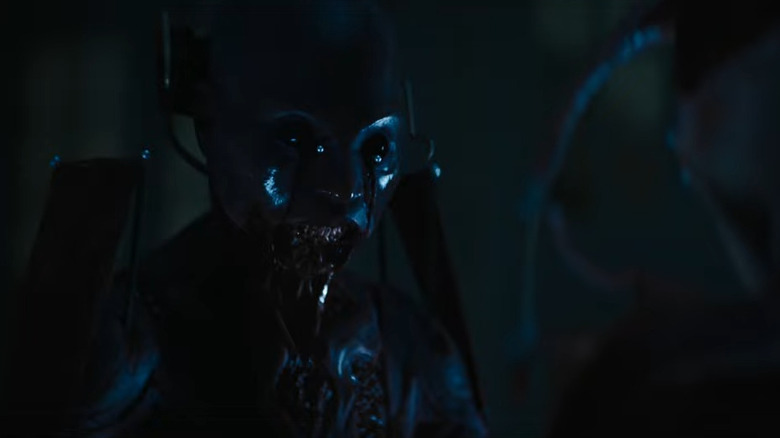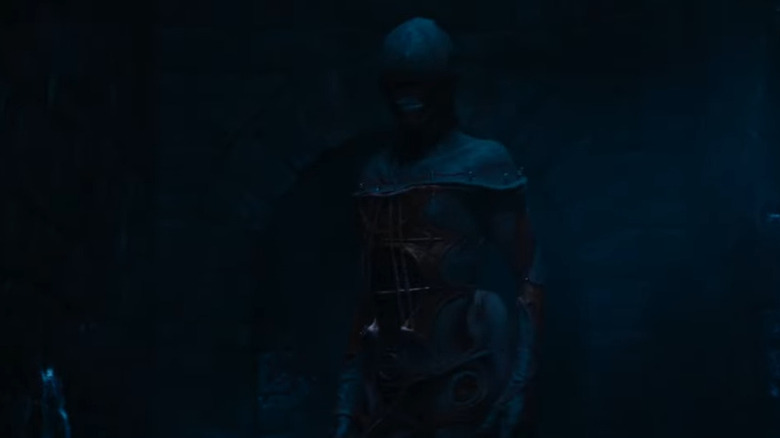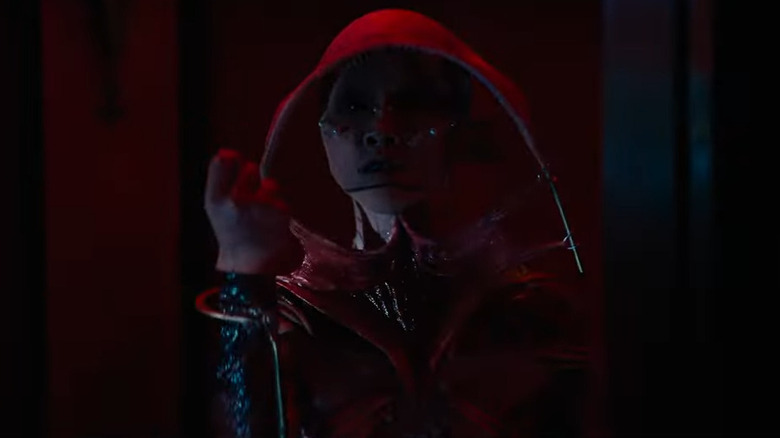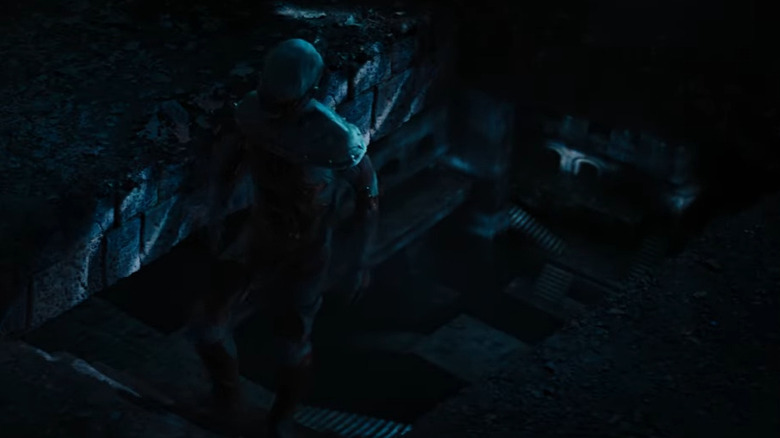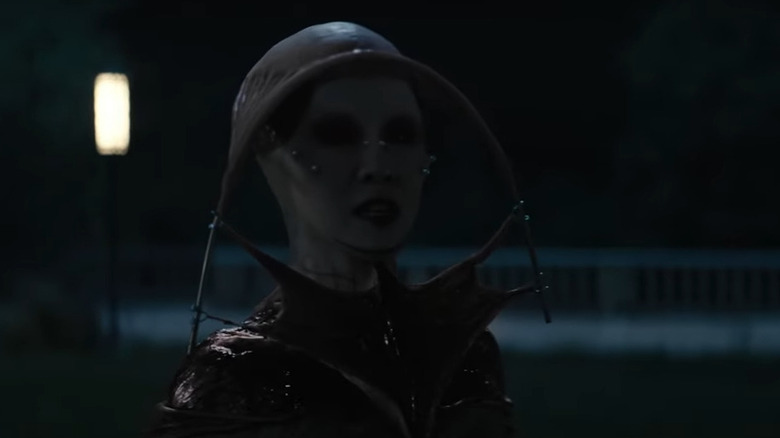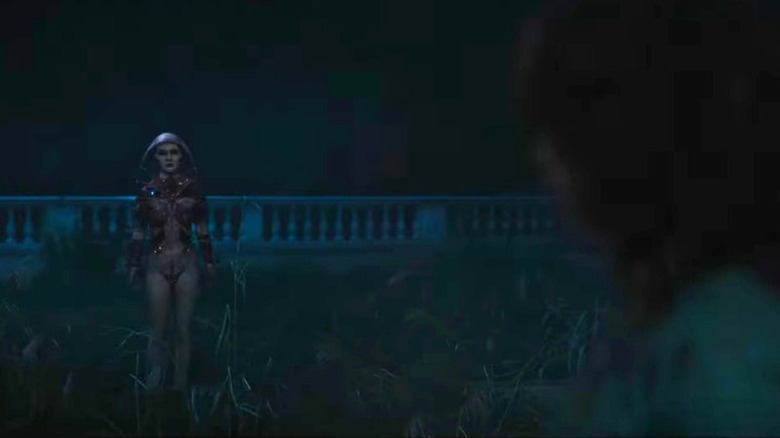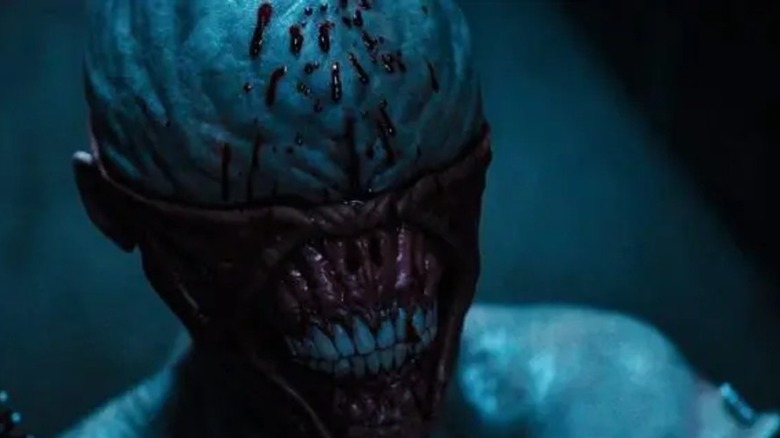Hellraiser's Cenobite Actors Talk About Wearing That Makeup And Their Backstories [Exclusive Interview]
David Bruckner's new film "Hellraiser," a remake of Clive Barker's 1987 film, features a mysterious puzzle box at its center. When solved, the puzzle magically summons a cadre of unusual, monstrous being called Cenobites. The Cenobites are in a constant state of full-body mutilation, and have wires and pins lining their anatomy, carefully holding flaps of skin and muscle tissue aloft, assuring them the greatest possible pain. For the Cenobites, though, extreme pain is merely the height of sensory experience. In Barker's original, the pain was the extreme of sexuality. In Bruckner's film, the pain leads the Cenobites to a more spiritual, holy experience. In aching for outer reaches of physical experience, the Cenobites — once human — have transformed themselves. Their goal, now, is to convert other interested parties.
The lead Cenobite in the "Hellraiser" universe is famously Pinhead, a ghoul with nails in his skull. And Pinhead would always be accompanied by a full retinue of other Cenobites, each with their own unique mutilation. In Bruckner's film, Pinhead was accompanied by The Weeper (Yinka Olorunnife), a jawless woman who was always weeping blood; The Gasp (Selina Lo), a woman with a "habit" of flesh stretched over the top of her head and her throat spread wide open; and The Chatterer (Jason Liles), a tall, threatening bruiser with his lips stretched way back from his teeth.
As one can imagine, the performances required to realize these Cenobites on the screen took a great deal of work from the actors, including an arduous makeup process that was difficult to bear.
/Film recently talked to Olorunnife, Lo, and Liles about their experiences playing the Cenobites, and what kind of backstories they invented for their characters.
'I stopped myself'
When you were cast as Cenobites, how much did you delve into "The Hellbound Heart," the original novella? Did you watch any of the previous films, or did you want to separate yourself and create things originally?
Lo: Well, I'd seen them as a teen. Probably [around] 13, 14. And I just wasn't really allowed. It was exclusively violent action movies, but not horror or romance in my house. But I was familiar with it and I remember being terrified just of the poster. And then when I did watch it, I was like, "Oh yeah, I was right. This is terrifying." But in a brilliant, fantastic way. And I did start to watch the original "Hellraiser" again once I got cast. But then I stopped myself because I just didn't want to be influenced. I know that I'd already seen and was a fan, and I just wanted to try and have something fresh for what I was going to do.
'I saw the VHS box in Blockbuster and was terrified by it'
Olorunnife: For me, I hadn't watched the movies prior to my audition for this. Similar to Selina, I grew up in a home where we weren't allowed to watch horror. We were a very Christian African home, and it's just something that we just weren't allowed to watch. But I knew the name, I knew the franchise. I recognized Pinhead. So when I did audition process, then that's when the research started for me. I made sure to watch the first three movies. And there are a lot of podcasts that out there, Clive Barker podcasts and "Hellraiser" podcasts, that I actually would listen to in order to understand kind of the lore and what it's all about. So the research came during the audition process. But then once I got the role, similar to Selina, it was because there were so many movies — I think ours is the eleventh — I didn't want to be completely influenced by what was done before. I wanted to bring my own energy and creativity to do the research. Understanding what "Hellraiser" was was so helpful, but then bring in my take to it.
Liles: Yeah, I had not seen them. I had not read the book. All I knew was when I was a kid, I saw the VHS box in Blockbuster and was terrified by it. I didn't want to watch it. And that was enough, and similar to them, I grew up in a home where it was "R-rated action films? Go for it. Horror films, love films? Nope, nope. That's not allowed." But you'd sneak a time to watch it in the playroom in the dark with the volume down so your parents wouldn't hear you, and then have nightmares for years.
'I'm walking on rods'
Liles: But this one I'd never seen. So I did go back and watch the first and the second one before the audition to pull from that for the audition. And then whenever I got an offer and I chatted with David [Bruckner] for a couple hours on Zoom, he was so detailed — he showed me a lot of concept art, we talked about where the character came from, and what was different about this Chatterer than Nicholas Vincent [the actor from 1987's "Hellraiser"] and the other Chatterers that have been played. And really making this one his own and bringing my own thing to it based on who is this character in this script. So there was definitely honoring the other Chatterer versions, but really making this one his own.
These Cenobites are even more elaborately mutilated than their cousins from the original films. The limited movement is part of their devotion to pain. What sort of physical challenges did you face as performers, having to act in such complicated makeup?
Olorunnife: Everyone had their own. Each costume was unique. What was similar, though, was it's tight, right? It's heavy and it's tight. So you had to learn how to move in something that was restrictive, but that weighed in between 40 to 60 kilos. So for the Weeper, my skin peels off on the shoulder, and there's pins that kind of hold it down there. So when you put it on, I can feel the weight of that on my arms, on my deltoids. And then my feet, I'm walking on rods. So [you had to make sure] you are walking in a way that you don't trip over. And I've got quite big feet, too, so making sure I didn't fall over, making sure the shoulders were kind of in a position that wasn't too achy, but still looked regal.
'You've got five to six hours in the makeup chair, and then a full day of shooting, and then an hour or so to get it off'
Lo: As Yinka was saying, they are very restricting. So for me, it was a lot of, it's a type of silicone that it feels like resistance bands and they're tight all across your body. So lifting your arm, it's like a workout with the resistance bands. And then in order for everything to just stay how it's supposed to be — because my costume is very skin tight — there's just a lot of compression. So you've got five to six hours in the makeup chair, and then a full day of shooting, and then an hour or so to get it off. Just a lot of compression. And then with the head piece, that was a metal rod here [across the forehead] that had to be really hard down in order for it to attach here [at the shoulders].
So there's just this very restrictive element, but I found that works. It works for the Cenobites because our movements are contained. I feel like they're very regal. And so in that way, it's great because it worked. But yes, it's very challenging because obviously it's not the most comfortable, but it's needed in order to create the effect. And what they did, Sierra and Josh Russell [the effects teams], I mean it's phenomenal — just the level of detail and the hours and time to get us being these characters.
Liles: Yeah, Sierra and Josh Russell did an absolutely incredible, epic job bringing all these characters together. I wish we could just talk about them for just an hour and that wouldn't be enough time.
'You know there are going to be challenges because your eyesight is like looking through a pinhole'
Liles: My first time putting this on, I was in their shop in San Fernando Valley here in L.A. and it was July, so it was like a hundred degrees. There was no air conditioning inside, and then I'm wearing all this head to toe. And I've been in stuff like this before, so I knew it was coming. But just profusely sweating going through half a dozen bottles of water, but not having to go to the bathroom for a couple hours whenever we did that. When you get on set, you know there are going to be challenges because your eyesight is like looking through a pinhole for Chatterer. Because he doesn't have eyes, but there's two little slits and you can kind of see. Then breathing can be a bit of an issue once you have the head on, and it's making the chatter sound with the "tk tk tk tk." It's like your head's in a bucket with a typewriter, so you can't really hear anything and you can't hear where anything's coming from.
And then your feet are in these silicone rubber feet, and you're sweating into those. They're slipping and sliding around inside. So walking or standing is difficult. I had no bathroom option while I was inside, so sometimes I'd have to hold it for, one day, like seven hours. And I was like, "Well, you sleep for seven or eight hours and don't go to the bathroom, so I'll be all right." I would just really limit ... I would just wet my mouth with water, and wouldn't even drink some days. Then I would chug afterwards. And then you're dealing with the weight, the tightness of everything.
'I'm called the Weeper for a reason'
Liles: It's extreme heat or it's outside, overnight, extreme cold. So there's a lot to deal with. And then you have to act on top of that. So it's really a physical and mental challenge of, "I'm going to take one breath at a time through the whole day. I'm going to be fine. I have people taking care of me." And the best thing in the world is at the end of the day when they say, "You ready to get out?" And you're like, "Yes!" You never say, "No, can I, in another hour or two, can I?" You're like, "Oh my God, I love all of you so much!" That's the best moment, when you're being birthed out of this thing and you're gross and sweaty and sticky with lube and you just can't wait to take a shower and go to sleep.
In the mythology of "Hellraiser," all the Cenobites were once human. What kind of backstories did you invent for the Weeper, the Gasp, and the Chatterer?
Olorunnife: For the Weeper? The first thing that came to mind is: I'm called the Weeper for a reason. I've got this weep. Where did the weep come from? Why am I weeping? What type of weep am I doing? Am I weeping for myself? Am I weeping for you? What does the weep mean? So I think that was kind of what I played with in my head when I was thinking of the backstory for my character. I didn't get a backstory for my character. And obviously the Weeper is new to the franchise, so basically, I just created one. And what I had created was that the Weeper was someone, when they were human, who didn't have an easy life. Probably had a major loss. I know we've got a "mother" Cenobite [in the film as well], but whether there was a loss of a child or loss of something significant. But then [the Weeper] was given that chance of a new life as a Cenobite.
'Maybe she wanted to be an actress, but was just a terrible, failed actress'
Olorunnife: So taking that loss, she weeps at that hardship of that life, but then turned into something beautiful and seeing the pleasure in the transformation. And so when I weep, I've got different types of weep. I'm weeping for you, whether it's empathy or weeping, kind of unlocking you. Or I just want to show you that I know you're screaming right now and you're scared, but don't worry because there's something beautiful on the other side of this. Just be patient with us and let us show you. So that's the kind of backstory I had created for my character.
And nothing specific? "She was born in year X?" Nothing like that?
Olorunnife: No, I didn't want to get specific as that because I didn't want to get carried away into then completely missing what I was trying to achieve here. So I thought, "Who is she as a human? What was her lot? What made her happy? What didn't make her happy? What were her interests? And what type of friends did she have around her?" But I didn't get as specific as the year that she was born or anything like that.
Lo: Well, for me, I took a lot of influence from the original Cenobite who was Pinhead's right-hand woman [Grace Kirby and Barbie Wilde]. And also in the original, she was previously a nun. Which, if you've noticed on our version there is skin, but it does have the shape of a habit. I do this a lot with characters that I'm not given a backstory with. I kind of think it's fun. Maybe she wanted to be an actress, but was just a terrible, failed actress. Just had enough of the world and people and decided to become a nun, realized that actually not really for her, and then kind of fell into the dark side. And then now she's a Cenobite and she genuinely believes what she's offering is the greatest. And she is dark in that way. And she does like the pain/pleasure.
'Chatterer's name was Jim, actually'
Liles: For Chatterer, I was lucky that Nicholas Vince, who played him in the first two films, actually wrote a short story that was illustrated by Clive Barker, and so it's very much thumbs up stamp of approval from Clive. So I can actually look at it; I don't even have to decide it. Chatterer's name was Jim, actually. And he has a very sad story, actually, as where it comes from. So I could pull from that, and I could pull from Nicholas Vince's performance some. Then when I talked with David Bruckner and he showed me concept art of why this one is different from the other, but how we're pulling from and honoring the old Chatterer as well, I really looked at and asked "Who is Chatterer in this script? In this story?" And I think the biggest thing that I talked about with an acting coach of mine, Lorin Salm, is that he really is trying to convert people to this religion of being a Cenobite.
He thinks it's the highest former of living. It's like he found his religion and this has changed his life and that's why he's so regal in the way he takes it so seriously. Everything's almost like a ritual or a sacrifice or a baptism. It's kind like a baptism scene to him with that scene with Aoife Hinds, when her back gets ripped off. They think that it is better than the way you're living and you don't understand, but you'll see. It's shown in the final scene with Roland Voight [Goran Višnjić's character]. His eyes change and he becomes a Cenobite, there's some text or something in the script that says, "Why did I ever resist?" And so I think all of us realize that when we become a Cenobite, and nobody understands that. But, "You'll see, it's better." And so that was really the creepy underlying tone for Chatterer.
"Hellraiser" is streaming now on Hulu.
